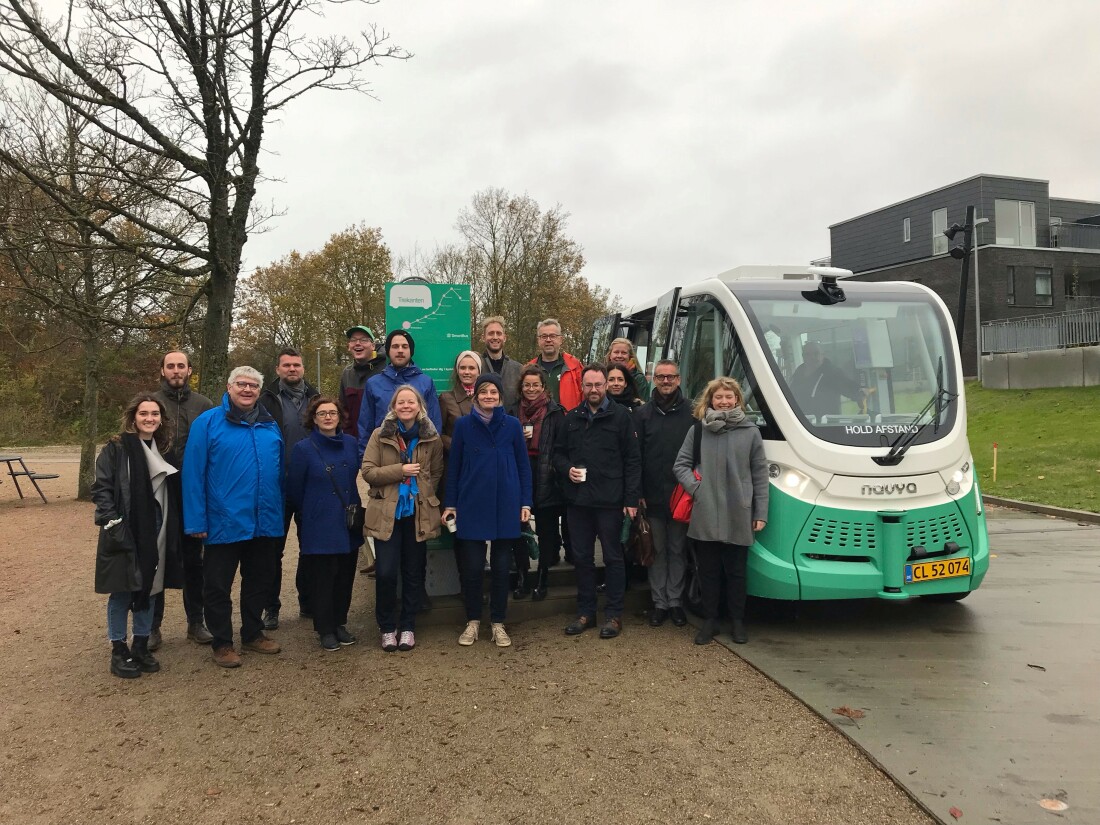How Will Self-Driving Vehicles Change Our Cities?
Investing in BremenHow will town planners and traffic management systems have to adapt when computer-controlled cars become part of the cityscape? These questions have been under investigation by the EU "ART Forum" project since March 2019. The project involves 14 partners from six countries around the North Sea, under the direction of the City of Bremen. It would be incorrect to assume that "ART" involves something artistic. In this case, the letters stand for "Automated Road Transport". Although, facing the challenges of autonomous vehicles can be described as an art, as the interdisciplinary project has shown.
The future has already arrived in the Danish town of Aalborg. The city ran a pilot project from March 2020 to November 2021, trialling the use of the first driverless electric buses in mixed traffic along a two kilometre stretch of road. In other words, the self-driving buses shared the road with vehicles driven by people as well as cyclists and pedestrians.
The eleven-seater minibuses travelled around in a residential area in Aalborg. The speed, the ten bus stops that had to be reached along the route and the timetable intervals were programmed into the on-board computer. At the end of the EU "ART Forum" project, which is part of the "Smart digital mobil" initiative run by the city of Bremen, its 20 members came to watch the pilot vehicles on site. Technical experts from the town council and regional administrative offices, transport operators and mobility service providers, and the research team, all wanted some initial indications of how autonomous vehicles will affect life in the city and in the regions, and how it will influence future transport management and city planning.

Passengers feel quite safe in the driverless buses
They are interested to know whether people will accept autonomous vehicles at all. "We discovered that it was mostly children and older people who used the bus. They felt safe travelling in it, and it also took on a social function. It became part of neighbourhood life and promoted a positive image, both locally and further afield", stated Torben Quickert, coordinator of the EU project and consultant on automated mobility for Bremen's Senator for climate protection, environment, mobility, city development and housing.
The urban environment is a complex system
Whether this kind of bus can regularly take its place in normal traffic, even in Bremen, remains to be seen. "We're talking about a development whose full implementation cannot yet be predicted. The urban environment is an extremely complicated place.", said Quickert. Developing the technology alone is already quite a challenge: the self-driving bus proved not to be very robust. "It had trouble coping with heavy rain, snow and fog. And if the bus encountered an obstacle on the road, such as a cat, it braked very sharply", reported Torben Quickert. For safety's sake, the bus travelled at a mere 15 kilometres per hour. And there was always a dedicated person on board who could take over in an emergency.

What about having separate lanes for autonomous vehicles?
Even if that is still very far in the future: at that time, self-driving vehicles will fundamentally change our traffic systems, and cities and local authorities want to be prepared for this. "Having self-driving vehicles on the motorways is relatively easy to achieve", said Torben Quickert, "but in town, we'd have to change a lot of things to enable this." One possible suggestion would be to have separate dedicated lanes for autonomous vehicles. The objective of driver-less vehicles is to improve traffic safety and to offer an alternative to (private) cars.
Local authorities want to know how the cities will have to change
Is it really possible to achieve these objectives? How will traffic flows change? How will the parking capacity this will release be used? How can existing technical options for traffic safety and compliance with regulations be better used? "Local authorities really need to get to grips with these questions", said Quickert. Unfortunately, there are no reliable answers as yet. However, one thing is clear for this expert: the transition phase, in which autonomous vehicles share the same road space with vehicles driven by humans, will be a long one. "And we don't yet know how autonomous vehicles that drive defensively will react when faced with cars driven by testosterone-fuelled drivers."
Closing conference in Bremen
There is also the risk that traffic levels will rise instead of falling. "It doesn't make much sense for everyone to have their own autonomous vehicle parked outside their front door. That won't bring about the mobility revolution. We need a practical vehicle-sharing concept", emphasised Quickert. There are a lot of ideas about what that might look like: the buses in the Danish town of Aalborg were just a beginning. The three-year EU "ART Forum" project will come to an end in September 2022, with a closing conference in Bremen. There, the partners want to be able to present recommendations and results which could provide initial responses to some of the many questions that are still open.
Success Stories
Bremen’s Economy in Figures: Statistics 2025
The State of Bremen is a strong economic hub. A look at the latest statistics highlights its economic strength — summarising key data such as cargo volumes, export performance, industry turnover, and more.
Learn moreMedium-Sized Companies in Bremen Showcasing the Full Range of the Local Economy
Medium-sized companies form the backbone of Bremen’s economy. They create jobs and produce goods that are in demand worldwide. Here is a selection of ten businesses that illustrate the diversity of Bremen’s economic landscape.
Learn moreTwelve international food and beverage companies in Bremen
Becks and Melitta may be high-profile brands, but international food and beverage companies also manufacture lots of other products in Bremen and Bremerhaven. Here are twelve examples.
Learn more
